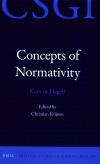
Justification of the State: Kant and Hegel
In: Ch. Krijnen (ed.), Concepts of Normativity: Kant or Hegel?
Both Kant and Hegel are convinced that the state is essential for human coexistence and cannot be replaced by another institution. Their justification of the state and their understanding of it does, however, differ. Kant is a theorist of natural rights and social contract, while Hegel is known as a critic of both of these theories and a theorist of an ethical state. Chotas explains what these two claims actually mean and in what respects do they contradict each other. He considers also their consequences for the notion of the state within a broader context of philosophy of these two thinkers.
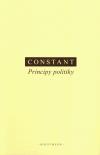
Benjamin Constant, Principy politiky
(Benjamin Constant, Principles of politics)
The translated book is the key political work of the Swiss-French political writer and politician Benjamin Constant (1767–1830). Constant considers here the impact of the French revolution on political thought. The present publication is the translation of the manuscript version of the book (1806) that Constant could not publish at the time due to political reasons. This version of the book confirms him as a key representative of classical Liberalism.
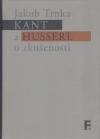
Kant a Husserl o zkušenosti
(Kant and Husserl on Experience)
The focus of the book is on the theory of experience in Immanuel Kant and Edmund Husserl, two major figures in the modern philosophy tradition. Although they both used the label of ‘transcendental idealism’ as to describe their own position, there have been only very few attempts to systematically compare their ways of thinking so far. The book is thus not only an attempt to explore into this rather neglected topic, but it is also a contribution to the problematic of transcendentalism and to the theory of knowledge in the western philosophy in general.
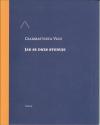
Giambattista Vico. Jak se dnes studuje
(On the Study Methods of Our Times)
On the Study Methods of Our Times may be the most accessible text of Neapolitan philosopher Gaimbattista Vico (1668-1744). It presents a perspicious comparision of modern study methods with the ancient ones, bringing examples from various disciplines, not just from natural science or medicine, but also from art or law theory. According to Vico with the growing specialisations the education becomes fragmentary and detached from civil life. The translation of the book is preceded by an extensive introduction putting Vico's proposal to an appropriate frame and explaining some of his central notions.
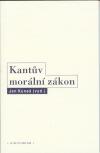
Kantův morální zákon
(Kant’s Moral Law)
The book is composed of two extended articles by the foremost interpreters of Kant, Konrad Cramer and Michael Wolff. It presents the moral law as a basic principle of Kant’s practical philosophy. The meaning of the moral law is interpreted and it is shown in what sense it is more fundamental than the categorical imperative. The book also provides an explanation of what Kant has in mind when he says that consciousness of the moral law may be called a fact of reason.
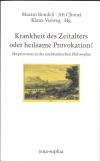
Krankheit des Zeitalters oder heilsame Provokation? Skeptizismus in der nachkantischen Philosophie
(Disease of the Epoch or Healing Provocation? Scepticism in Post-Kantian Philosophy)
The present collection of essays is devoted to the debate about the new scepticism, which emerged in Germany as immediate response to Kant's critical philosophy. Sceptical doubts of Maimon and Schulze opposed the Kantian claim that it is possible a priori to determine the nature of experience and the conditions of its possibility. Reinhold defended Kant against such criticism, but modified his claim. This debate inspired Fichte, Schlegel and later Hegel to develop their own philosophy.
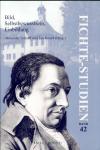
Bild, Selbstbewusstsein, Einbildung
(Image, Self-Consciousness, Imagining)
This volume of the Fichte-Studien (Fichte-Studies) presents Fichte's conception of image in systematic connection with his science of knowledge and its development. The papers focus on the topics of image, imagination and self-consciousness both from the perspective of transcendental philosophy and from the perspective of the philosophy of the absolute.
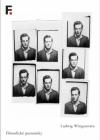
Ludwig Wittgenstein. Filosofické poznámky
(Ludwig Wittgenstein. Philosophical notes)
A commented Czech translation of the key text of Wittgenstein's 'middle' period introducing discussions of his post-Tractarian conception of language, his project of 'phenomenology' and philosophy of mathematics.
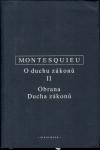
Charles Louis de Montesquieu, O duchu zákonů II. Obrana Ducha zákonů
(The Spirit of the Laws II. The Defence of the Spirit of the Law)
The volume contains the translation of the second part of the Spirit of the Laws (1748, books XX-XXXI), summary of the book from the jansenist magazine Nouvelles ecclésiastiques (1749), Montesquieu's Defence of the Spirit of the Laws (1750), Censorship proposition of Sorbonne's Theological Faculty (1752) and Montesquieu's Answers and Explications for the Sorbonne Theological Faculty (1753). The second part of the Spirit of the Laws is translated from the post-mortem edition of the Spirit of the laws (1757), all other texts follow the new edition of Montesquieu’s complete works. Translation is accompanied by translator's note, explanatory notes and index. None of these texts was ever published in Czech language.
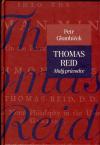
Thomas Reid. Malý průvodce
(Thomas Reid. A short Companion)
The book presents a short introduction into few selected points of Reid's philosophy as a first attempt at a standalone book on Reid in Czech. After brief summary of his life and work it examines Reid's critique of Hume. The third chapter considers the central concept of Reid's philosophy: common sense. The last chapter presents Reid's aesthetics in its immediate historical and systematic context. Reid's philosophical system includes surprisingly sophisticated aesthetic theory as an integral part of his epistemology.




